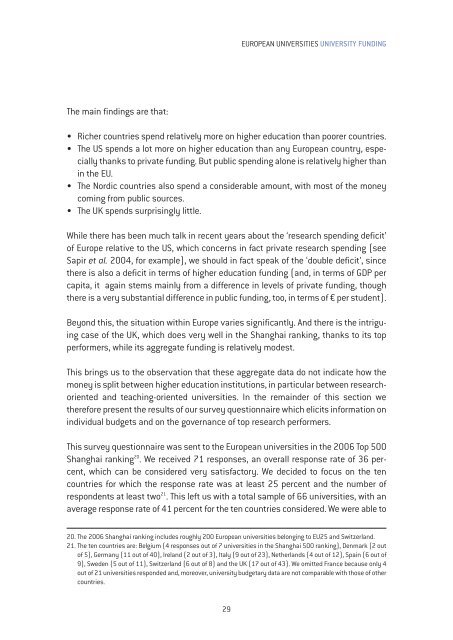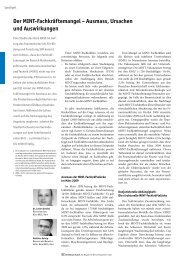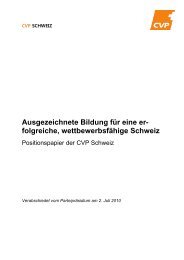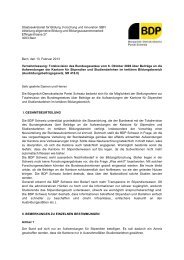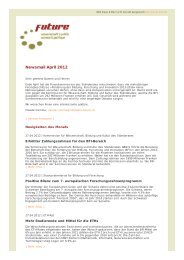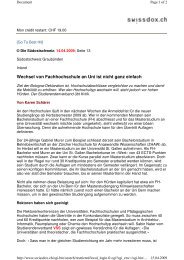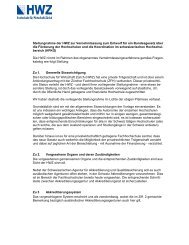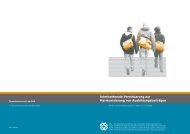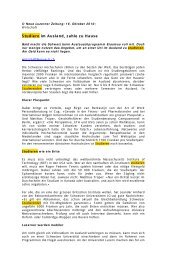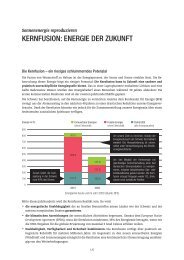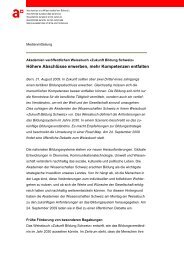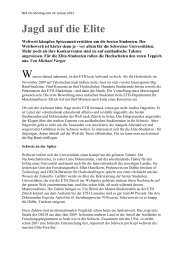Higher aspirations: an agenda for reforming European universities
Higher aspirations: an agenda for reforming European universities
Higher aspirations: an agenda for reforming European universities
Create successful ePaper yourself
Turn your PDF publications into a flip-book with our unique Google optimized e-Paper software.
EUROPEAN UNIVERSITIES UNIVERSITY FUNDING<br />
The main findings are that:<br />
• Richer countries spend relatively more on higher education th<strong>an</strong> poorer countries.<br />
• The US spends a lot more on higher education th<strong>an</strong> <strong>an</strong>y Europe<strong>an</strong> country, especially<br />
th<strong>an</strong>ks to private funding. But public spending alone is relatively higher th<strong>an</strong><br />
in the EU.<br />
• The Nordic countries also spend a considerable amount, with most of the money<br />
coming from public sources.<br />
• The UK spends surprisingly little.<br />
While there has been much talk in recent years about the ‘research spending deficit’<br />
of Europe relative to the US, which concerns in fact private research spending (see<br />
Sapir et al. 2004, <strong>for</strong> example), we should in fact speak of the ‘double deficit’, since<br />
there is also a deficit in terms of higher education funding (<strong>an</strong>d, in terms of GDP per<br />
capita, it again stems mainly from a difference in levels of private funding, though<br />
there is a very subst<strong>an</strong>tial difference in public funding, too, in terms of € per student).<br />
Beyond this, the situation within Europe varies signific<strong>an</strong>tly. And there is the intriguing<br />
case of the UK, which does very well in the Sh<strong>an</strong>ghai r<strong>an</strong>king, th<strong>an</strong>ks to its top<br />
per<strong>for</strong>mers, while its aggregate funding is relatively modest.<br />
This brings us to the observation that these aggregate data do not indicate how the<br />
money is split between higher education institutions, in particular between researchoriented<br />
<strong>an</strong>d teaching-oriented <strong>universities</strong>. In the remainder of this section we<br />
there<strong>for</strong>e present the results of our survey questionnaire which elicits in<strong>for</strong>mation on<br />
individual budgets <strong>an</strong>d on the govern<strong>an</strong>ce of top research per<strong>for</strong>mers.<br />
This survey questionnaire was sent to the Europe<strong>an</strong> <strong>universities</strong> in the 2006 Top 500<br />
Sh<strong>an</strong>ghai r<strong>an</strong>king 20 . We received 71 responses, <strong>an</strong> overall response rate of 36 percent,<br />
which c<strong>an</strong> be considered very satisfactory. We decided to focus on the ten<br />
countries <strong>for</strong> which the response rate was at least 25 percent <strong>an</strong>d the number of<br />
respondents at least two 21 . This left us with a total sample of 66 <strong>universities</strong>, with <strong>an</strong><br />
average response rate of 41 percent <strong>for</strong> the ten countries considered. We were able to<br />
20. The 2006 Sh<strong>an</strong>ghai r<strong>an</strong>king includes roughly 200 Europe<strong>an</strong> <strong>universities</strong> belonging to EU25 <strong>an</strong>d Switzerl<strong>an</strong>d.<br />
21. The ten countries are: Belgium (4 responses out of 7 <strong>universities</strong> in the Sh<strong>an</strong>ghai 500 r<strong>an</strong>king), Denmark (2 out<br />
of 5), Germ<strong>an</strong>y (11 out of 40), Irel<strong>an</strong>d (2 out of 3), Italy (9 out of 23), Netherl<strong>an</strong>ds (4 out of 12), Spain (6 out of<br />
9), Sweden (5 out of 11), Switzerl<strong>an</strong>d (6 out of 8) <strong>an</strong>d the UK (17 out of 43). We omitted Fr<strong>an</strong>ce because only 4<br />
out of 21 <strong>universities</strong> responded <strong>an</strong>d, moreover, university budgetary data are not comparable with those of other<br />
countries.<br />
29


